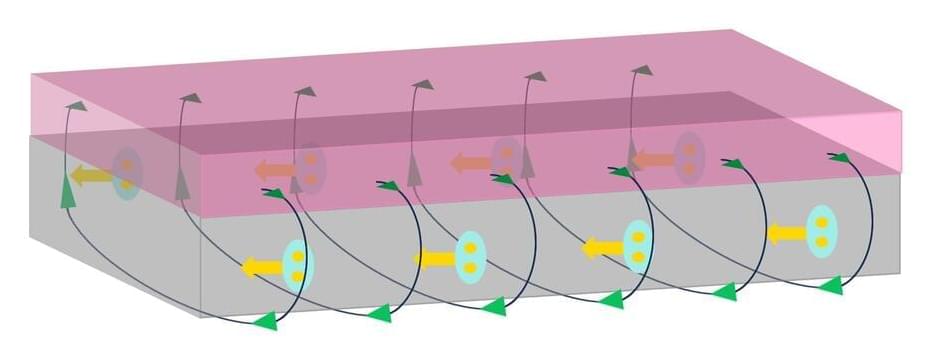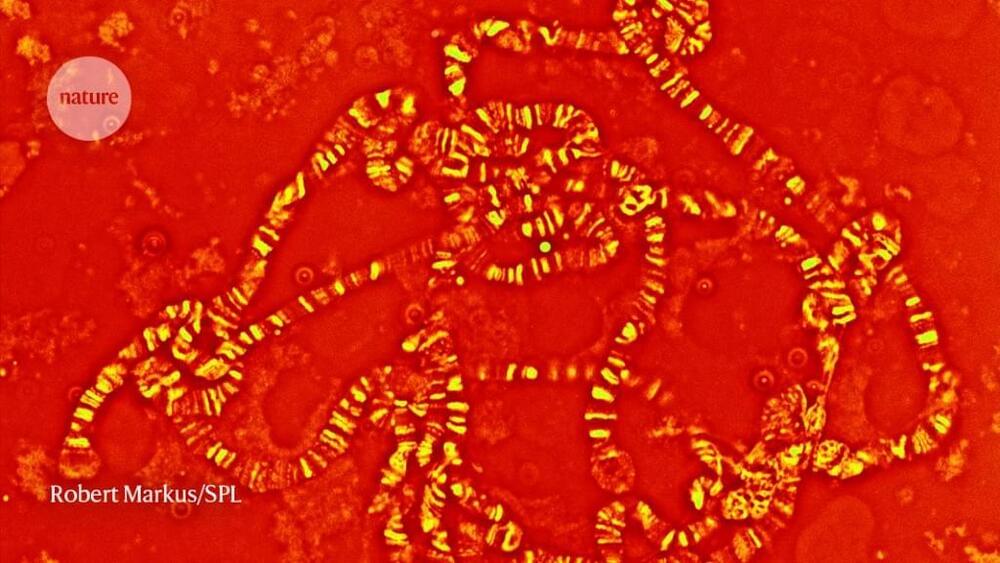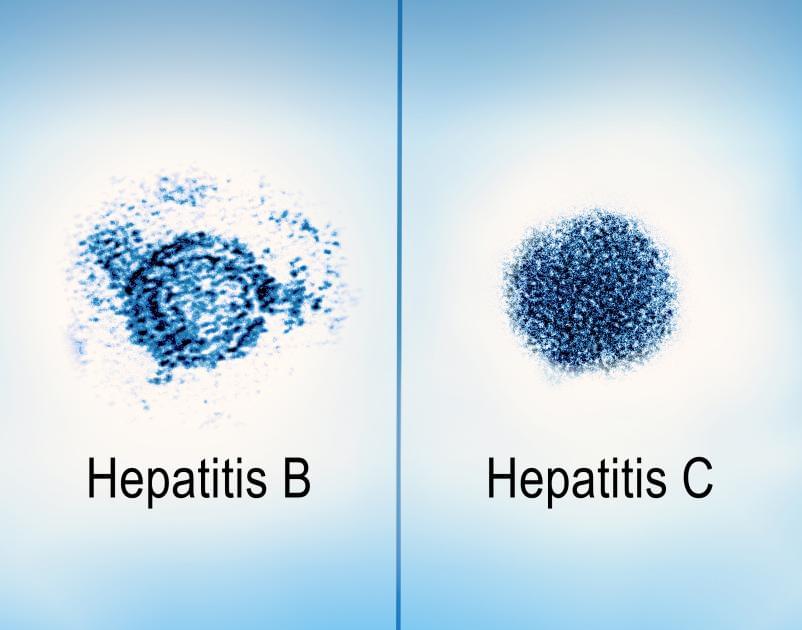A double layer of twisted, folded DNA protects cells from mechanical forces while allowing them freedom to assemble.



MIT scientists and colleagues have created a simple superconducting device that could transfer current through electronic devices much more efficiently than is possible today. As a result, the new diode, a kind of switch, could dramatically cut the amount of energy used in high-power computing systems, a major problem that is estimated to become much worse.
Even though it is in the early stages of development, the diode is more than twice as efficient as similar ones reported by others. It could even be integral to emerging quantum computing technologies. The work, which is reported in the July 13 online issue of Physical Review Letters, is also the subject of a news story in Physics Magazine.
“This paper showcases that the superconducting diode is an entirely solved problem from an engineering perspective,” says Philip Moll, Director of the Max Planck Institute for the Structure and Dynamics of Matter in Germany. Moll was not involved in the work. “The beauty of [this] work is that [Moodera and colleagues] obtained record efficiencies without even trying [and] their structures are far from optimized yet.”
The stars have always held significance for humans, but it is only recently that we have begun to comprehend vast groups of them, or galaxies, in the far reaches of the universe. The Webb telescope was anticipated by everybody as a game-changer in the field of astronomy. And we knew exactly what we believed Webb would completely astound us with. However, its most recent findings have blown away the proportions of our expectations. The Webb Telescope, according to American astrophysicist Neil deGrasse Tyson, has allowed us to glimpse ghosts from the past.
Subscribe Here ➡
#Voyager #Space
Watch over 2,400 documentaries for free for 30 days AND get a free Nebula account by signing up at https://curiositystream.com/upandatom and using the code “upandatom”.
New streaming platform Nebula: https://watchnebula.com/
The Anthropic Principle and why we might live in a multiverse.
Hi! I’m Jade. Subscribe to Up and Atom for physics, math and computer science videos!
*SUBSCRIBE TO UP AND ATOM* https://www.youtube.com/c/upandatom.
Visit the Up and Atom Store.
The Big Bang theory suggests that the universe emerged out of nothing, signifying the beginning of the universe. Before this, there was nothing — no time, no space. However, what if I told you that time doesn’t exist and that the Big Bang Theory is incorrect? Recent discoveries made by the James Webb Telescope provide evidence that challenges the validity of the Big Bang Theory.

In September 2020 we sat down with Robert Sapolsky, Stanford professor and the author of Human Behavioral Biology lectures (https://youtu.be/NNnIGh9g6fA) to discuss if it’s possible for our society to reconcile our understanding of justice with scientific understanding of human behaviour.
Why do humans, most likely, have no free will? How does that link to depression and other psychiatric disorders? Can people accept the idea that there is no free will and start using, what science tells us about the reasons behind our behaviour, as a basis for making sense of justice and morality? If yes, can we even imagine what such society would look like?
This is a third interview with Robert. The first (https://youtu.be/VrQkl7PaA1s) and the second (https://youtu.be/yp9HE5xfojY) talks are available on our channel.
Robert Sapolsky is one of the world’s leading neuroscientists, with a focus on the physiological effects of stress. (For years, he spent his summers in Kenya, alone except for the baboons he was observing.) Steve asks Robert why we value human life over animals, why he’s lost faith in the criminal justice system, and how to look casual when you’re about to blow-dart a very large and potentially unhappy primate.
This episode was originally published March 5, 2021.
For a full transcript, resources, and more, visit: https://freak.ws/3WQAjmF
ABOUT PEOPLE I (MOSTLY) ADMIRE:
People I (Mostly) Admire is hosted by Steven Levitt, the unorthodox University of Chicago economist and co-author of the Freakonomics book series, who tracks down other high achievers and asks questions that only he would think to ask. Guests include all-time Jeopardy! champion (and now host) Ken Jennings, YouTube C.E.O. Susan Wojcicki, W.N.B.A. champion Sue Bird, Operation Warp Speed chief Moncef Slaoui, and neuroscientist/actress (also now Jeopardy! host) Mayim Bialik. Winner of Adweek‘s 2021 Best Interview Podcast of the Year.
SUBSCRIBE TO PEOPLE I (MOSTLY) ADMIRE:
YouTube: https://freak.ws/3yIl6dl.
Stitcher: https://freak.ws/3ENOP8v.
Apple Podcasts: https://freak.ws/3ELfGST
Spotify: https://freak.ws/3D6uqKV
ABOUT FREAKONOMICS RADIO NETWORK:
Freakonomics began as a book, which led to a blog, a documentary film, more books, a pair of pants, and in 2010, a podcast called Freakonomics Radio. Hosted by Stephen J. Dubner, it’s one of the most popular podcasts in the world, with a reputation for storytelling that is both rigorous and entertaining. Its archive of more than 500 episodes is available, for free, on any podcast app, and the show airs weekly on NPR stations. Freakonomics Radio is now the flagship show of the Freakonomics Radio Network, which includes the podcasts No Stupid Questions (est. 2020), People I (Mostly) Admire (2020), and Freakonomics, M.D. (2021).
FREAKONOMICS RADIO NETWORK PODCASTS:

An international team of scientists has succeeded in experimentally confirming a characteristic of topological materials.
Scientists from around the globe have experimentally confirmed a unique characteristic of topological materials. Using ‘3D glasses’-like technology and particle accelerators, they successfully visualized the relationship between an electron’s topology and its quantum mechanical properties, marking a significant step forward in understanding these future-focused materials.
Topological quantum materials are seen as a beacon of hope for energy-saving electronics and the high-tech of the future. A defining feature of these materials is their ability to conduct spin-polarized electrons on their surface, while remaining non-conductive inside. To put this into perspective: In spin-polarized electrons, the intrinsic angular momentum, i.e. the direction of rotation of the particles (spin), is not purely randomly aligned.

Viral hepatitis is an inflammatory liver disease caused by infection with any of the known hepatitis viruses—A, B, C, D, and E. Most of the global viral hepatitis burden is from hepatitis B and C, which affect 354 million people and result in 1.1 million deaths annually. The Centers for Disease Control and Prevention estimates that in 2020 there were 14,000 and 50,300 new acute infections of hepatitis B and C in the United States, respectively, while at least 880,000 people in the country were living with chronic (long-term) hepatitis B and 2.4 million people had chronic hepatitis C. About half of those with viral hepatitis are unaware of their infection. Chronic and persistent inflammation from the disease can lead to liver failure, cirrhosis, or liver cancer. Viral hepatitis affects all ages and there are pronounced inequities in disease outcomes in the United States. Hepatitis B and C disproportionately affect people living with HIV, and HIV increases the rate of complications and death in people with viral hepatitis.
On this World Hepatitis Day, the National Institute of Allergy and Infectious Diseases (NIAID), part of the National Institutes of Health, shares a snapshot of its investments in basic (laboratory), preclinical (laboratory/animal), and clinical (human) research to improve screening, prevention and treatment for hepatitis B and C. Scientists in the Hepatic Pathogenesis and Structural Virology sections of NIAID’s Laboratory of Infectious Diseases conduct basic and translational research to better understand hepatitis B and C disease progression, clarify the role of hepatitis viruses in liver cancer, and inform discovery of new vaccines, medicine and technologies. Both NIAID’s Division of AIDS (DAIDS) and the Division of Microbiology and Infectious Disease (DMID) support scientific programs focused on hepatitis B and C research and curative strategies, reflecting the widespread impact of viral hepatitis and the urgent need for safe and effective interventions.
Finding a hepatitis B cure.